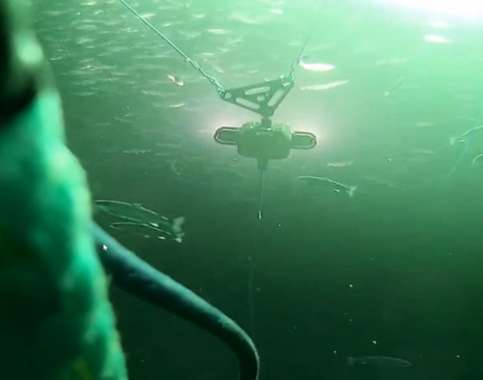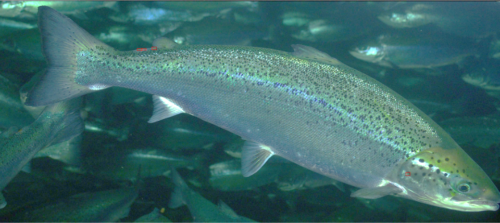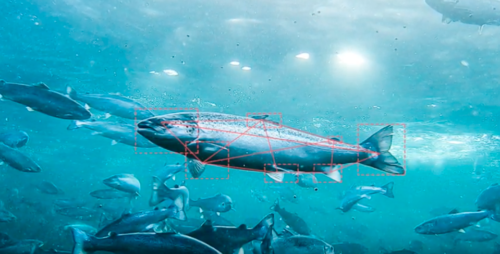Salmon farms in Norway are leading the charge in digitising.
With a background in engineering and data science, Bryton Shang, Aquabyte’s CEO, combined his experience and interests to apply machine learning and AI to an industry where it could make an impact.
“I soon realised how important fish is as a sustainable food source, with aquaculture producing half the fish that we eat today. But, of course, a big practical problem is understanding how fish grow when they are beneath the surface.”
To combat that issue, he developed a smart underwater camera that can be used to allow machine learning to monitor the fish and understand how they develop. This has a number of benefits including allowing fish farmers to keep a close eye on their healthy and the amount of feed they need, improving sustainability.

Climate-friendly investment
Aquabyte’s product recently caught the attention of venture capital fund Earthshot Ventures, which backed the company with an undisclosed investment. “Earthshot invests in companies that use technology to support their ESG mission and focus. That is what drew them to us, and us to them – to build technologies that help us monitor and manage these different environmental aspects of fish farming, and at a macro level, also help sustainably produce more fish.”
“Our work to make aquaculture both more efficient and environmentally friendly is a problem worth solving –and we’ve been addressing it in one of the most challenging environments in the world.”
“The capital from this investment will allow us to accelerate our growth into different use cases and new markets. We’re working towards a future with more sustainable fish and food production — which is in line with Earthshot’s mission,” Shang said.
Tackling environmental challenges
Aquabyte’s ESG programmes were developed in conjunction with The Nature Conservancy, with sustainability and environmental policies at the core of everything they do at the company. “It’s about improving the existing farms as well as promoting production of sustainable fish in general.”
“Through the Aquabyte system, we help create positive impact by reducing feed waste, reducing the environmental impact of fish farming, and reducing impact of parasites like sea lice. We want to measure our positive impact to help promote the adoption of these types of sustainable technologies and encourage radically better fish farming.”
“This is important because food production is the second largest contributor to greenhouse gases…So by making an already sustainable source of protein better – even more sustainable, better for the environment, and easier to manage, we’re helping shift from a highly intensive form of food production to less intensive food production, which is a net positive.”

Improving welfare and cutting costs
As mentioned, it’s not just about the environmental impact but about improving the quality of the fish that are farmed. AI systems can help improve the efficiency of feeding and help to measure outbreaks of parasites to reduce infestation risks.
“If we’re talking about sustainability at scale, we need to expand the environments in which fish is grown. This means figuring out how to grow fish in the open oceans or on land, areas where you need remote monitoring. That’s part of what Aquabyte is working towards: smart, data-driven fish farms that will allow the industry to grow.”
“If you can measure infestations, you can time treatments to reduce the overall number of treatments. Reducing feed waste helps cut costs and also reduces environmental impact.”
More than an investment
While Aquabyte and Earthshot Ventures did not disclose the scale of the investment, both have been clear that this is more than cash injection. It is a partnership that is designed to help improve the company and the industry as a whole.
Partnerships with investors, as well as bringing together the technology-focused Silicon Valley and fish farming expertise from the aquaculture sector has been “a key philosophy that has allowed us to be successful by developing complex technology that is actually usable.”
“We add value because we built together with farmers from the beginning. We are built by fish farmers for fish farmers. We have drawn experts across disciplines from around the world. We’ve been international from the start, and the diversity of expertise and perspectives makes us strong and unique.”

Fish farming is crucial to building a sustainable world
With countries looking at how to feed growing populations in a sustainable manner, fish farming has become an increasingly attractive prospect, as it’s a relatively sustainable food source. While with beef, it takes approximately 7kg of feed to produce 1kg of meat, for fish farming you get 1kg of fish for 1kg of feed.
“Looking at macroeconomics and population growth, it’s clear that we need to produce more fish in a way that the environment can sustainably support.”
“We need to double seafood production by 2030 – we won’t be able to harvest more fish from the ocean. We can create better options while also protecting the fish, the waters, and the communities and ecosystems that depend on them. To feed the world, fish farming is already the most sustainable solution, and we can make it even better,” Shang concluded.

